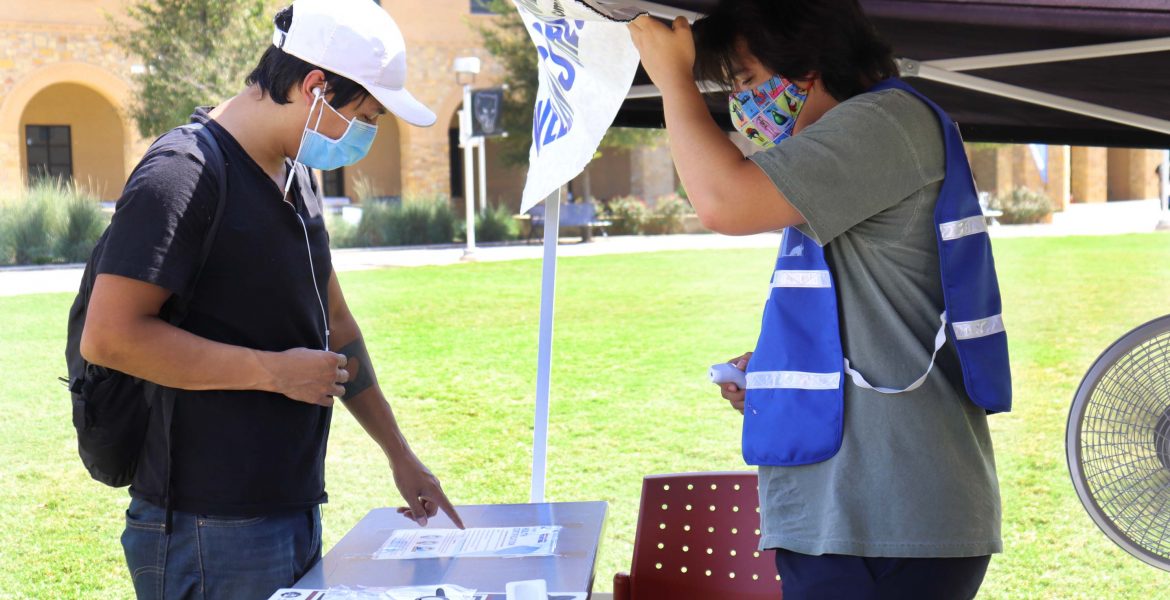Since the fall semester began, students at Texas A&M University-San Antonio are required to check in at wellness stations to attend classes on campus. However, the wellness checks are optional for faculty and staff.
The decision was based on the presumption of faculty and staff being able to social distance easier, like in their offices, than students, Kathryn Funk-Baxter, vice president for business affairs, said Oct. 22 in a Zoom interview.
“Employees spend most of their time in a very small area where they’re not with 20 other people for a prolonged period of time, and so, we felt that was the distinction,” Funk-Baxter said.
Staff and faculty are still required to follow safety protocols such as social distancing and wearing face masks at all times unless when alone in their office. Face shields alone are not an acceptable form of face covering; face shields accompanied with a face mask are acceptable.
The university advises faculty and staff to self-monitor for COVID-19 symptoms daily on an honor system basis.
The wellness checks were implemented and developed by A&M-San Antonio and are managed by the university. Workers at the wellness stations are employees of the university. The wellness stations were previously operated through a third-party, but Funk-Baxter said their services were no longer needed. Faculty and staff are asked to stay home if they are sick.
Each campus in the Texas A&M-System has its own COVID-19 protocols; however free testing is available at each A&M campus.
University employees were required by the A&M-System to take a COVID-19 training to obtain a certification upon completion. Their training is similar to the training students were required to complete prior to the beginning of the semester, Funk-Baxter said.
Despite being university employees, student workers are required to check-in at the wellness stations even if they are not attending class on campus, Adriana Contreras, director of communications and marketing operations, said.
The university updates the number of COVID-19 cases weekly. As of Nov. 4, there are 14 employee cases and 65 student cases, according to A&M-San Antonio’s website.
Faculty takes extra step for students
Although they are not required to, some faculty voluntarily stop by one of the six university-run wellness stations before their classes.
“I see some staff that still check in for our peace of mind,” said Adriana Vallejo, criminology freshman.
Dr. Megan Wise de Valdez, associate professor and biology program coordinator, teaches one online class and three hybrid classes this semester.
”If my students are expected to provide safety to each other, then I should also model that same behavior,” Wise de Valdez said. “Because, not only are we wanting to protect each other, and just because we’re faculty doesn’t mean that we shouldn’t be held to the same set of standards.”
Robert Alonzo, assistant professional track faculty in criminology, teaches three face-to-face classes and one online course this semester. Out of the two weekdays when Alonzo teaches in-person classes, he gets to campus before the wellness stations are open; however, in addition to self-monitoring, he visits a wellness station, Alonzo said.
“What I like to do before I go to my first class is I have them do a wellness check on me,” Alonzo said. “I go out there and do it before I walk into class.”
History junior Jessica Esqueda says faculty and staff should check in at the wellness stations.
“I feel like, ya know, they are people like us, they go out like us,” Esqueda said. “They should be getting checked daily too because you don’t know who they have been going out with.”
Conducting health checks are optional, according to the CDC’s website. However, universities that implement in-person health checks should follow the same guidelines for businesses such as social distancing and providing personal protective equipment (PPE) to protect the screeners. They also suggest encouraging individuals to self-monitor for symptoms.
ACHA talks COVID-19 strategies
The CDC affirmed on its website health checks are not completely effective because those who are asymptomatic may be able to clear screening and still be infected. They are also not an alternative to social distancing and other protective measures.
The American College Health Association has followed alongside the CDC’s recommendations, and has seen other methods of testing and clearance nationwide, said Gerri Taylor, co-chair of the ACHA COVID-19 task force, in a Nov. 3 phone interview.
Taylor said both ACHA and the CDC have tried to be considerate with colleges as not every college has the same capability to do the amount of testing or procedures as others. However, there is not enough data to prove if any of these strategies are more effective than others — or at all.
“It’s a hard situation,” Taylor said. “In the past with other diseases we’ve…watched them for so long that…if we have a student with meningitis, we know how to manage that; we know how to deal with contacts. This is a, you know, novel virus so it’s been challenging to say the least.”
ACHA is releasing a survey in December to determine what methods were effective and are predicting to have the results by January 2021. Taylor said looking at the data is the ideal way to identify this.
“I think our country is still trying to determine what strategy has been the most effective,” Taylor said.
COVID-19 at A&M-San Antonio
Although the university said the wellness checks are optional for faculty and staff because faculty are less likely to be exposed, staff were the first notified of the surge in cases.
A&M-San Antonio’s COVID-19 Monitoring Group sent an email to faculty and staff Oct. 21 updating employees on an isolated COVID-19 case among five individuals “within a close working group.” It also reminded employees to follow protocols such as making sure all students have a wristband from the wellness stations, and not moving the furniture in classrooms. The email also illustrated how the university is dealing with the positive cases.
“In addition to meeting the CDC guidelines for when an individual is able to complete isolation and be around others, the University exceeds CDC expectations by not allowing anyone recovering from the virus to return to campus until they are COVID-19 symptom-free,” the COVID-19 Monitoring Group wrote in their email.
Students were later updated on the increase in cases and on changes being made to prevent the spread through a mass email sent Nov. 1 from Dr. Mari Fuentes-Martin, vice president of student success and engagement, and Darnell Smith, director of intercollegiate athletics and recreational sports.
Funk-Baxter wrote in an email to The Mesquite that students were previously receiving communication but an email was not sent out immediately because recommendations for changes needed to be approved before an email could be sent.
While A&M-San Antonio implements wellness checks, COVID-19 guidelines vary among universities and colleges.
COVID-19 procedures differ throughout campuses
Texas A&M University-College Station does not have wellness stations, but they ask students and staff to self-monitor daily for symptoms and to stay home if they are feeling ill. The university has implemented a random testing strategy to track down the virus and identify how it is moving. It is a self-administered saliva test and if students are selected to randomly test, it is not mandatory but it is recommended.
Universities like the University of Texas at San Antonio are also advising students, faculty and staff to self monitor daily and have a daily health assessment on the university’s website that the community is encouraged to take. Others like San Antonio College have also implemented health and temperature checks and have designated entrances to buildings to prevent the spread.
“The adherence to safety protocols across our university community continues to slow the spread of the virus and the number of cases among our campus remains relatively low,” A&M-San Antonio’s COVID-19 Monitoring Group wrote in the Oct. 21 email.
Lauren Mayes contributed to this story.







